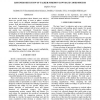Free Online Productivity Tools
i2Speak
i2Symbol
i2OCR
iTex2Img
iWeb2Print
iWeb2Shot
i2Type
iPdf2Split
iPdf2Merge
i2Bopomofo
i2Arabic
i2Style
i2Image
i2PDF
iLatex2Rtf
Sci2ools
ICASSP
2008
IEEE
2008
IEEE
Listener detection of talker stress in low-rate coded speech
We describe an experiment where listeners were asked to detect two specific forms of stress in talkers’ recorded voices heard via six different simulated communication systems. Both task-induced stress and dramatized urgency were used. Communication systems included low-rate digital speech coding combined with bit errors, packet loss, and packet loss concealment. Twenty-four listeners participated in a total of 11,520 detection trials. A parallel investigation of word intelligibility in sentence context used 576 trials. Intelligibility results showed wide variance due to communication system and stress detection results showed less variance. More specifically, we found that listener detection of dramatized talker urgency was 4.7 times more robust to communication system degradations than word intelligibility in sentence context.
| Added | 30 May 2010 |
| Updated | 30 May 2010 |
| Type | Conference |
| Year | 2008 |
| Where | ICASSP |
| Authors | Stephen Voran |
Comments (0)

